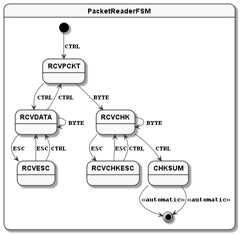- Notifications
You must be signed in to change notification settings - Fork4
Finite State Machine in Kotlin
License
open-jumpco/kfsm
Folders and files
| Name | Name | Last commit message | Last commit date | |
|---|---|---|---|---|
Repository files navigation
This work is licensed underApache License 2.0
This is a small implementation of an FSM in Kotlin.
The state machine implementation supports events triggering transitions from one state to another while performing an optional action as well as entry and exit actions.
Event driven state machine.
External and internal transitions
State entry and exit actions.
Default state actions.
Default entry and exit actions.
Determine allowed events.
Multiple state maps with push / pop transitions
Automatic transitions
Externalisation of state.
Typed event parameters and return values.
✓ Multiple state maps
✓ Push / pop transitions
✓ Automatic transitions
✓ Externalisation of state
✓ Typed event parameters
✓ Typed event return values
✓ Simple Visualization
✓ Detail Visualization
✓ Gradle Plugin for Visualization
✓ Timeouts
✓ Corountines
❏ Different type of contexts for Nested statemaps
This is the classic turnstile FSM model from [SMC](http://smc.sourceforge.net/)
Assume we and to manage the state on a simple lock.We want to ensure that thelock() function is only called when the lock is not locked and we wantunlock() to be called when locked.
Then we use the DSL to declare a definition of a statemachine matching the diagram:
| Start State | Event | End State | Action |
|---|---|---|---|
LOCKED | PASS | LOCKED | alarm |
LOCKED | COIN | UNLOCKED | unlock |
UNLOCKED | PASS | LOCKED | lock |
UNLOCKED | COIN | UNLOCKED | returnCoin |
classTurnstile(varlocked:Boolean =true) {fununlock() {assert(locked) {"Cannot unlock when not locked" }println("Unlock") locked=false }funlock() {assert(!locked) {"Cannot lock when locked" }println("Lock") locked=true }funalarm() {println("Alarm") }funreturnCoin() {println("Return coin") }overridefuntoString():String {return"Turnstile(locked=$locked)" }}
We declare 2 enums, one for the possible states and one for the possible events.
enumclassTurnstileStates {LOCKED,UNLOCKED}enumclassTurnstileEvents {COIN,PASS}
classTurnstileFSM(turnstile:Turnstile) {privateval fsm= definition.create(turnstile)funcoin()= fsm.sendEvent(TurnstileEvents.COIN)funpass()= fsm.sendEvent(TurnstileEvents.PASS)companionobject {privateval definition= stateMachine(TurnstileStates.values().toSet(),TurnstileEvents::class,Turnstile::class ) { initialState {if (locked)TurnstileStates.LOCKEDelseTurnstileStates.UNLOCKED } default { onEntry { startState, targetState, _->println("entering:$startState ->$targetState for$this") }// default transition will invoke alarm action { state, event, _->println("Default action for state($state) -> event($event) for$this") alarm() } onExit { startState, targetState, _->println("exiting:$startState ->$targetState for$this") } }// when current state is LOCKED whenState(TurnstileStates.LOCKED) {// external transition on COIN to UNLOCKED state onEvent(TurnstileEvents.COIN toTurnstileStates.UNLOCKED) { unlock() } }// when current state is UNLOCKED whenState(TurnstileStates.UNLOCKED) {// internal transition on COIN onEvent(TurnstileEvents.COIN) { returnCoin() }// external transition on PASS to LOCKED state onEvent(TurnstileEvents.PASS toTurnstileStates.LOCKED) { lock() } } }.build() }}
With this definition we are saying:When the state isLOCKED and on aCOIN event then transition toUNLOCKED and execute the lambda which is treatedas a member of the context{ unlock() }
When the state isLOCKED and on eventPASS we perform the actionalarm() without changing the end state.
Then we instantiate the FSM and provide a context to operate on:
val turnstile=Turnstile()val fsm=TurnstileFSM(turnstile)
Now we have a context that is independent of the FSM.
Sending events may invoke actions:
// State state is LOCKEDfsm.coin()// Expect unlock action end state is UNLOCKEDfsm.pass()// Expect lock() action and end state is LOCKEDfsm.pass()// Expect alarm() action and end state is LOCKEDfsm.coin()// Expect unlock() and end state is UNLOCKEDfsm.coin()// Expect returnCoin() and end state is UNLOCKED
This model means the FSM can be instantiated as needed if the context has values that represent the state. The idea is that the context will properly maintain it’s internal state.
The FSM can derive the formal state from the value(s) of properties of the context.
TheDocumentation contains more detail on creating finite state machine implementations.
The documentation contains examples for:
Use this repository for SNAPSHOT builds. Releases are on Maven Central
repositories { maven { url'https://oss.sonatype.org/content/groups/public' }}The dependency used in common modules.
dependencies { implementation'io.jumpco.open:kfsm:1.9.0-RC1'}dependencies { implementation'io.jumpco.open:kfsm-linuxX64:1.9.0-RC1'}dependencies { implementation'io.jumpco.open:kfsm-mingwX64:1.9.0-RC1'}For more information about visualization options usekfsm-io.jumpco.open.kfsm.viz
About
Finite State Machine in Kotlin
Topics
Resources
License
Uh oh!
There was an error while loading.Please reload this page.
Stars
Watchers
Forks
Packages0
Uh oh!
There was an error while loading.Please reload this page.
Contributors2
Uh oh!
There was an error while loading.Please reload this page.




